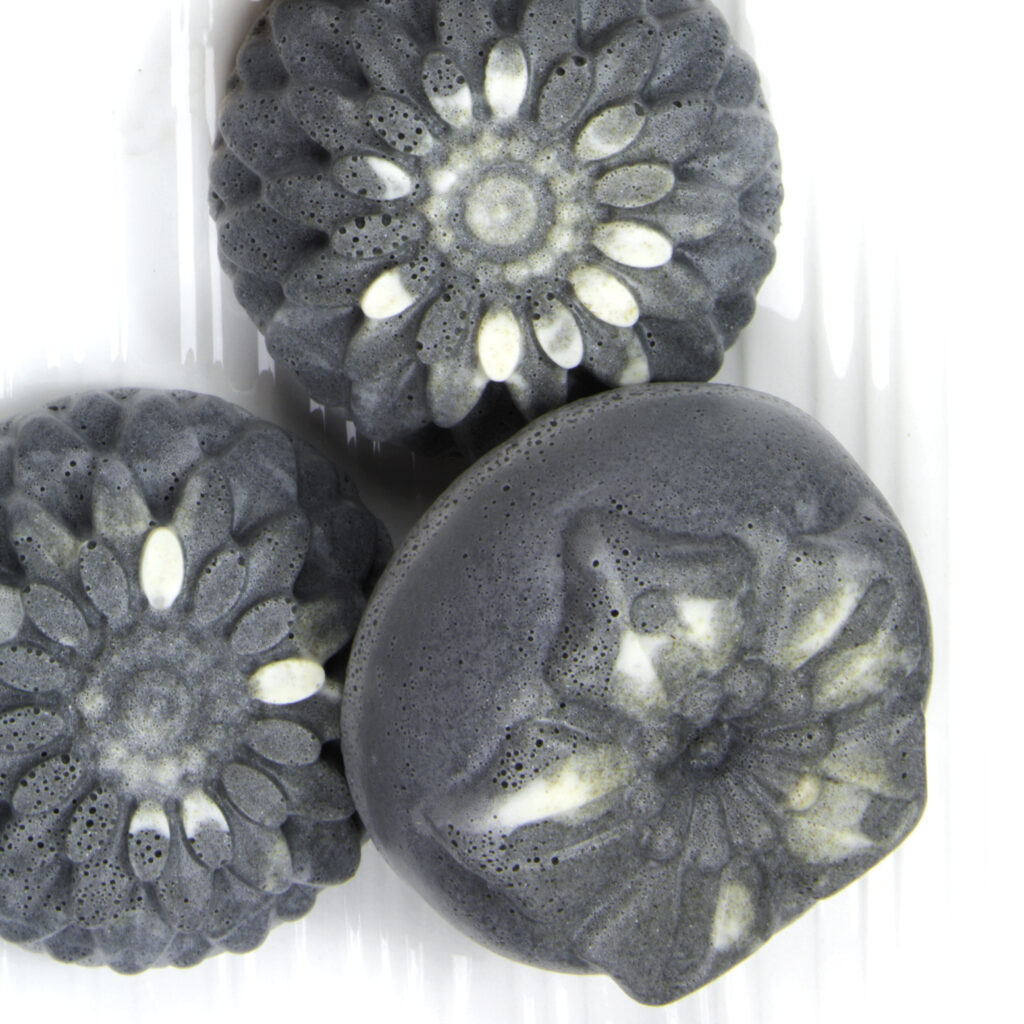Charcoal Oatmeal Soap
Home » Mixtures » Bath & Body » Charcoal Oatmeal Soap

Charcoal Oatmeal Soap is formulated for normal to oily facial skin and is helpful for clearing and calming acne-prone skin. The mix of oatmeal soap base, activated charcoal, tea tree and peppermint essential oils, with added tamanu oil and Aloe Vera allows for deep cleansing and gentle stimulation of new skin cells production while soothing and reducing inflammation of the skin. Tamanu oil is especially beneficial for acne-prone or similar skin problems. A very small amount of essential oils is used. This soap is meant to be used on both the face and body. Regardless, caution is advised around sensitive eye area.
Oatmeal base.
Activated charcoal.
Tamanu oil.
Aloe Vera.
EO’s: peppermint & tea tree.
Coconut Oil. Palm Oil. Safflower Oil.
Glycerin. Water,
Oatmeal.
Sodium Hydroxide (lye).
Avoid contact with eyes.
Since this soap is on the softer type, keep it dry between uses.
Do not use if allergic to coconut oil.
A short Guide to Ingredients & Their Benefits

Carrier Oils
A popular emollient in skin and hair products, coconut oil is derived from the kernel of coconuts. Rich in natural antioxidants that aid to stabilize free radicals with skin-soothing ability to hydrate, promote scar healing and reduce inflammation. Thanks to fatty acids, most notably high lauric and caprylic acid content, coconut oil with its anti-bacterial, antifungal, and antiviral properties is considered beneficial to maintaining overall health of the skin by protecting it from harmful germs and bacteria and helping balance oil production. Due to its 4 on a comedogenic scale of 5 rating, it is considered comedogenic with above average tendency to clog skin pores. However, if coconut oil is combined with other oils and butters in topicals it is considered an effective treatment for acne due to its potent lauric and caprylic acid levels.
Caution: Coconut is a tree nut; thus a patch test is recommended to avoid allergic reaction.
Palm oil is derived from the fruit of the Elaeis guineensis tree native to Africa. It contains fatty acids like palmitic acid, stearic acid, lauric acid and myristic acid, which are saturated fatty acids. Additionally rich in natural antioxidants, including Vitamins A and E, palm oil hydrates, restores and seals moisture over the skin and reduces free radicals providing a boost to the overall appearance of the skin and protecting it from premature aging. Emollient and nourishing properties make it beneficial for sensitive, dry and irritated skin conditions. It works well when added to other oils helping to produce creamy texture and stable lather.
Safflower oil is derived from the seeds of the thistle-like annual plant safflower and has emollient and anti-inflammatory properties similar to sunflower oil. Lightweight, high in linoleic acid and antioxidants, safflower oil naturally improves skin hydration, skin texture and tone, helps to prevent damage to healthy cells from UV rays and reduces signs of aging as well as improves inflammatory skin conditions like eczema, psoriasis, acne and skin damage like scars and minor wounds. At 0 rating, safflower oil is considered non-comedogenic and does not clog pores.
Tamanu oil is derived from the seeds of the tamanu nut tree that grows in Southeast Asia and has a strong nutty scent. It is rich in fatty acids, both oleic and linoleic, making it a powerful emollient with ability to deeply penetrate and hydrate skin layers. Beneficial for a numerous skin condition due to its powerful natural anti-inflammatory, antimicrobial, antibacterial, antifungal and antioxidant abilities. It helps maintain balance in skin production of surplus sebum and fights bacteria associated with acne, making it an idea addition to topicals for treating oily skin and healing acne breakouts. Due to its high astringent and antioxidant content, tamanu oil provides protection from free radicals and naturally improves skin tone and complexion by stimulating new skin tissues growth, reducing sun damage, age spots and other signs of aging. Additionally, since tamanu oil is enriched with a high level of anti-inflammatory and antibiotic properties, it is effective in helping to treat psoriasis and eczema, minor burns, bruises, scars, sores as well as promoting healing of wounds. Caution: Do not use if you have tree-nut allergies.

Essential Oils
Due to its potent antioxidant, astringent, anti-microbial and anti-inflammatory properties, peppermint essential oil is beneficial in topicals as a skin-soothing, skin-cleaning and cooling agent helping to combat harmful bacteria, detoxify and calm inflamed, irritated and itchy skin while supporting its natural ability to heal. It also provides relief for minor burns, dry skin, skin rashes and other skin discomforts including all forms of acne.
Antibacterial, antifungal, antiseptic, and antiviral properties of the tea tree oil allow it to destroy bacteria in wounds avoiding infections and soothe redness and itchy skin while healing. It helps to regulate skin oil production reducing breakouts from acne and lessens the effects of eczema. It is also beneficial for many other skin conditions as well as providing relief from bug bites, burns and cuts.

Additional Ingredients
Prized for its anti-inflammatory and antimicrobial properties and one of the best natural remedies for irritated, inflamed skin, fighting bacteria and promoting wound healing. Its skin-soothing, skin-softening and hydrating abilities bring relief to burns, rushes, and reduces redness. It is rich in vitamin C and E, and beta-carotene enhancing production of collagen in the body and improving skin tone. It absorbs quickly and unclogs pores.
Activated charcoal is a 100% food grade black powder that has excellent cleansing powers as it removes toxins, dirt, excess oil and dead cells from the skin. As an antibacterial agent it is well suited to use in soaps for helping to clear skin affected by psoriasis, acne, and eczema.
Glycerin, also known as glycerine or glycerol, is a natural humectant derived from plant-based oils that helps retain and preserve natural moisture of the skin, keeping it soft and hydrated while allowing it to breathe. It is non-greasy and well suited for all skin types, from oily and combination skin to skin affected by acne, eczema, psoriasis and rosacea.
Oatmeal is naturally rich in anti-inflammatories and antioxidants, including avenanthramides, flavonoids, and phenols making it an effective agent in calming, skin-soothing, and nourishing while gently removing dead cells and cleaning the skin. It is a beneficial addiction in soaps for irritated and sensitive skin and can be useful in dealing with acne and mild to moderate eczema.
Sodium Hydroxide (NaOH), known as caustic soda and referred to as lye, has been used for centuries as an essential saponifying agent to make solid bar soaps. A chemical reaction between lye and the oils results in making a new substance that is known as soap; thus, the term saponification.
Each ingredient has a story and unique attributes that are detailed to provide information and to ensure that allergic reaction is avoided.
A patch test of the product is recommended, especially for sensitive skin.
The information provided is purely educational.
Other Herbal Mixtures for Bath & Body
Coming Soon…
PC: AgPixArt.com


